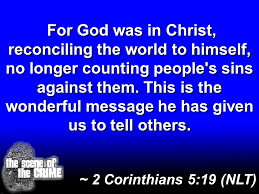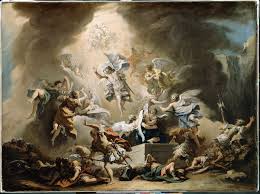


![]()
Isaiah 52Awake, awake, 7 How beautiful upon the mountains
The Suffering Servant13 See, my servant shall prosper;he shall be exalted and lifted up, and shall be very high. 14 Just as there were many who were astonished at him —so marred was his appearance, beyond human semblance, and his form beyond that of mortals— 15 so he shall startle many nations; kings shall shut their mouths because of him; for that which had not been told them they shall see, and that which they had not heard they shall contemplate. |
Based on radio, television, and movies, hardly anyone these days seems to understand or appreciate the message Jesus gave to His disciples to be delivered to all mankind. That message was good news, not bad news. It was the best possible news human ears could ever hope to hear. It would seem that counterfeit Christianity is to be found these days on every side. Real life in Jesus is a rare commodity---and sadly the message that goes out under the name of Christ is often blurred, unclear, distorted, or not really heard at all.
A brief summary of this central message of the New Testament, the Evangel, commonly called "the Gospel" is contained as a prologue to the Apostle Paul's great chapter in First Corinthians discussing the resurrection of the dead.
"Now I would remind you, brethren, in what terms I preached to you the gospel, which you received, in which you stand, by which you are saved, if you hold it fast---unless you believed in vain.
"For I delivered to you as of first importance what I also received, that Christ died for our sins in accordance with the scriptures, that he was buried, that he was raised on the third day in accordance with the scriptures, and that he appeared to Cephas, then to the twelve. Then he appeared to more than five hundred brethren at one time, most of whom are still alive, though some have fallen asleep. Then he appeared to James, then to all the apostles. Last of all, as to one untimely born, he appeared also to me. For I am the least of the apostles, unfit to be called an apostle, because I persecuted the church of God.
"But by the grace of God I am what I am, and his grace toward me was not in vain. On the contrary, I worked harder than any of them, though it was not I, but the grace of God which is with me. Whether then it was I or they, so we preach and so you believed. Now if Christ is preached as raised from the dead, how can some of you say that there is no resurrection of the dead? But if there is no resurrection of the dead, then Christ has not been raised; if Christ has not been raised, then our preaching is in vain and your faith is in vain. We are even found to be misrepresenting God, because we testified of God that he raised Christ, whom he did not raise if it is true that the dead are not raised. For if the dead are not raised, then Christ has not been raised. If Christ has not been raised, your faith is futile and you are still in your sins. Then those also who have fallen asleep in Christ have perished. If for this life only we have hoped in Christ, we are of all men most to be pitied. But in fact Christ has been raised from the dead, the first fruits of those who have fallen asleep." (1 Corinthians 15:1-20)


Our English word gospel is from the Old English godspel that is, god = good and spel = tale or talk. The Greek word used in the New Testament is euaggelion which combines the adverb eu = good or well with aggelos = messenger. ( eu is the opposite of kakos = evil).
"But how are men to call upon him in whom they have not believed? And how are they to believe in him of whom they have never heard? And how are they to hear without a preacher? And how can men preach unless they are sent? As it is written, 'How beautiful are the feet of those who preach good news!' But they have not all obeyed the gospel; for Isaiah says, 'Lord, who has believed what he has heard from us?' So faith comes from what is heard, and what is heard comes by the preaching of Christ" (Romans 10:14-17).
In communicating "the gospel" to outsiders of the Christian faith, some evangelists have insisted on "repentance" as an integral part of the message. The Greek word for repentance simply means to change one's mind, and therefore one's lifestyle. Obviously this is not merely a one-time event but a lifelong calling. See Repent or Perish. Think of a fresh new start in life, not merely guilt and shame for the misdeeds of the past.
Discipleship ordinarily follows spiritual rebirth in assuring that those who have met Jesus through the message of an evangelist, move on in their changed life with Jesus. Discipleship has been badly misunderstand in recent years.
John Eldredge said recently, "What have we come to accept as "discipleship"? A friend of mine recently handed me a program from a large and successful church somewhere in the Midwest. It's a rather exemplary model of what the idea has fallen to. Their plan for discipleship involves, first, becoming a member of this particular church. Then they encourage you to take a course on doctrine. Be "faithful" in attending the Sunday morning service and a small group fellowship. Complete a special course on Christian growth. Live a life that demonstrates clear evidence of spiritual growth. Complete a class on evangelism. Consistently look for opportunities to evangelize. Complete a course on finances, one on marriage, and another on parenting (provided that you are married or a parent). Complete a leadership training course, a hermeneutics course, a course on spiritual gifts, and another on biblical counseling. Participate in missions. Carry a significant local church ministry "load." You're probably surprised that I would question this sort of program; most churches are trying to get their folks to complete something like this, one way or another. No doubt a great deal of helpful information is passed on. My goodness, you could earn an MBA with less effort. But let me ask you: A program like this—does it teach a person how to apply principles, or how to walk with God? They are not the same thing.
![]()

Jesus, speaking to His disciples on the night of His betrayal, assured His disciples that He and the Father would send God the Holy Spirit into the world after He, Jesus, had ascended into heaven following the resurrection:
"Nevertheless I tell you the truth: it is to your advantage that I go away, for if I do not go away, the Counselor will not come to you; but if I go, I will send him to you. And when he comes, he will convince the world concerning sin and righteousness and judgment: concerning sin, because they do not believe in me; concerning righteousness, because I go to the Father, and you will see me no more; concerning judgment, because the ruler of this world is judged. (John 16:7-11)
Some Christians believe that Jesus died for only the Elect. I am among those who believe that Jesus died for all persons who have ever lived or are yet to be born, whether or not they choose to accept Him into their lives. The issue we must all face before God then is, "Do I wish to be forgiven?" "Am I willing to be loved by my Creator and to accept His full provision for all the sins I have committed in the past, or will commit in the future?" "Am I willing to live in a universe governed ultimately by self-giving love?" "Am I willing to allow God to put the old self-life of Adam in me to death?" "Am I willing to allow God to indwell me as Lord of my life?"
"...and he is the expiation (hilasmos) for our sins, and not for ours only but also for the sins of the whole world. (1 John 2:2)
On the night of His betrayal, arrest and trial, Jesus prayed to His Father a great and marvelous prayer of Intercession, commonly known as the Great High Priestly prayer. In this prayer we find the assurance that all who have been chosen by God will come to Him:
"I have manifested thy name to the men whom thou gavest me out of the world; thine they were, and thou gavest them to me, and they have kept thy word. Now they know that everything that thou hast given me is from thee; for I have given them the words which thou gavest me, and they have received them and know in truth that I came from thee; and they have believed that thou didst send me. I am praying for them; I am not praying for the world but for those whom thou hast given me, for they are thine; all mine are thine, and thine are mine, and I am glorified in them. And now I am no more in the world, but they are in the world, and I am coming to thee. Holy Father, keep them in thy name, which thou hast given me, that they may be one, even as we are one. While I was with them, I kept them in thy name, which thou hast given me; I have guarded them, and none of them is lost but the son of perdition, that the scripture might be fulfilled. (John 17:6-12)

In regard to the complex and paradoxical issue of Election and Predestination, I believe it may have been the late Donald Grey Barnhouse, who served as Pastor for many years at Philadelphia's Tenth Presbyterian Church, who once gave this simple illustration:
A group of people are all standing in a room which has several doors. Above one door is a sign which reads
Those who choose to enter the door find on the back side of the door a sign which reads,
I am the door. If anyone enters by Me, he will be saved, and will go in and out and find pasture. The thief does not come except to steal, and to kill, and to destroy. I have come that they may have life, and that they may have it more abundantly.(John 10:9-10)
"...I am the Alpha and the Omega, the beginning and the end. To the thirsty I will give from the fountain of the water of life without payment. He who conquers shall have this heritage, and I will be his God and he shall be my son. But as for the cowardly, the faithless, the polluted, as for murderers, fornicators, sorcerers, idolaters, and all liars, their lot shall be in the lake that burns with fire and sulfur, which is the second death." (Revelation 21:5-8)
Terms such as "faith," "believe," "repent" "accepting Christ as personal Savior," "trusting Christ" can become clichés and code words devoid of content for many in today's society. There are many related issues to the simple statement that "God loves you and has a wonderful plan for your life." Does the gospel obligate us in any way? Is it necessary to understand the Lordship of Christ in order to be saved? What is the place of "good works" in the gospel, and what role does the Law have in our salvation? What does it mean to be "born-again"? What happens at the point in time we become a Christian? After I have accepted Christ into my life, what happens if I get back into sin?
As much as I am able I will be happy to address questions from non-Christians, searchers-after-truth, new Christians and anyone else who has unresolved questions about the Christian faith. Please feel free to email me.
 The king of a bright, distant land (where we who are Christians hold
citizenship), has dispatched us into the darkness of Planet Earth as ambassadors,
i.e., as qualified emissaries, to deliver a message of good news.
The king of a bright, distant land (where we who are Christians hold
citizenship), has dispatched us into the darkness of Planet Earth as ambassadors,
i.e., as qualified emissaries, to deliver a message of good news.
This message is called "The Gospel." As ambassadors we need to understand the content of the message, to be able to answer questions from the hearers, and to help the listener respond so as to become a member of our King's family:
"All this is from God, who through Christ reconciled us to himself and gave us the ministry of reconciliation; that is, in Christ God was reconciling the world to himself, not counting their trespasses against them, and entrusting to us the message of reconciliation.
So we are ambassadors for Christ, God making his appeal through us. We beseech you on behalf of Christ, be reconciled to God."
In I Corinthians 15:1-20, where the gospel is defined for us, note that the first emphasis is that Christ died for our sins. This immediately brings into focus the Person of Jesus: His life, His teachings, His accomplishments, His present status as Lord of the universe. Also raised is the issue of human sin, guilt, and ultimate accountability to God. The death, burial and resurrection of our Lord are established as historic facts. The authenticity of the message is attested to by the apostles and by every generation of hearers down to the present, including the changed-life manifested by you, the ambassador delivering the message. The message must be delivered with tact, with love, and hopefully in contemporary language free of clichés and archaic imagery.
Evangelist is one of gifts of the Holy Spirit given to come followers of Jesus Christ, but not to all. Ea ch and everyone who knows Jesus can tell others about our Lord. We are called to do so.
Evangelist, evangelism. (evangelistes) from eu = well, plus aggelos = messenger. The gift of bringing the good news of God to unbelievers individually and in groups. The content of the message is outlined in 1 Cor. 15. Ray Stedman compares this gift to the digestive apparatus of the human body which has the ability to take material which is not a part of the body and transform it into parts of the body. Evangelists are also to teach other believers how to lead people to the Lord Jesus. Timothy evidently did not have this gift but Paul nevertheless urged him to "do the work of an evangelist".

Additional Help
Michael Jones' "The Most Important Web Page you will ever read."

Why is it so important? Well... each of us, barring illness or accident, is likely to live to be as much as 70-80 years of age, and if we take care of ourselves we might get to be ninety or one hundred or more years old. One hundred years on planet Earth. What then? Some people think that death is the end... after you die you cease to exist. I reject that idea; I think that human beings are immortal spirit beings, and that after our bodies die the essence of ourselves lives on. The question is this: what do we do then? What happens to us? I think we have a decision to make, and it determines if we spend that time in a place of eternal love and fellowship with God and other human beings, or if we spend it in a place where we are eternally separated from God... and since everything that is good comes directly from Him, I think I prefer to spend eternity with Him.


The term "gospel" is widely used in Christian circles. It has also lost its meaning for modern-modern man--as have many other older, classic Bible words. Words like gospel desperately need to be understood and explained both within the Christian community and--even more so--when talking to non-Christians about our faith. The following notes are a short study-guide for recovering the deep meaning of the great New Testament word "gospel."
Dictionary: 1. OE: Godspel, good talk or news, from "gød"=good + "speil." Spell is from speil = talk, tale: a spoken word or form of words believed to have magic power. 2. The "glad tidings." 3. Euangelion from Greek eu = good, well and angelia, message. Eu is the opposite of kakos, evilly. (English words using eu: eulogize, eucharist, eugenics, euphemism, euphoria, euthanasia).
Usage: "Gospel" is used 93 times in the NT: Matthew 4:23, Matthew 9:35, Matthew 24:14, Matthew 26:13, Mark 1:1, Mark 1:14, Mark 1:15, Mark 10:29, Mark 13:10, Mark 14:9, Mark 16:15, Luke 9:6, Luke 20:1, Acts 8:25, Acts 8:40, Acts 14:7, Acts 14:21, Acts 15:7, Acts 16:10, Acts 20:24, Romans 1:1, Romans 1:3, Romans 1:9, Romans1 :15, Romans 1:16, Romans 2:16, Romans 10:16, Romans 11:28, Romans 15:16, Romans 15:19, Romans 15:20, Romans 16:25, 1 Corinthians 1:17, 1 Corinthians 4:15, 1 Corinthians 9:12, 1 Corinthians 9:14, 1 Corinthians 9:16, 1 Corinthians 9:18, 1 Corinthians 9:23, 1 Corinthians 15:1, 2 Corinthians 2:12, 2 Corinthians 4:3, 2 Corinthians 4:4, 2 Corinthians 8:18, 2 Corinthians 9:13, 2 Corinthians 10:14, 2 Corinthians 10:16, 2 Corinthians 11:4, 2 Corinthians 11:7, Galatians 1:6, Galatians 1:7, Galatians 1:8, Galatians 1:9, Galatians 1:11, Galatians 2:2, Galatians 2:5, Galatians 2:7, Galatians 2:14, Galatians 3:8, Galatians 4:13, Ephesians 1:13, Ephesians 3:6, Ephesians 3:7, Ephesians 6:15, Ephesians 6:19, Philippians 1:5, Philippians 1:7, Philippians 1:12, Philippians 1:16, Philippians 1:27, Philippians 2:22, Philippians 4:3, Philippians 4:15, Colossians 1:5, Colossians 1:23, 1 Thessalonians. 1:5, 1 Thessalonians 2:2, 1 Thessalonians 2:4, 1 Thessalonians 2:8, 1 Thessalonians 2:9, 1 Thessalonians 3:2, 2 Thessalonians 1:8, 2 Thessalonians 2:14, 1 Timothy 1:11, 2 Timothy 1:8, 2 Timothy 1:10, 2 Timothy 1:11, 2 Timothy 2:8, 2 Timothy 2:9, Philemon 13, 1 Peter 4:6, 1 Peter 4:17, Revelation 14:6.
The Power of the (gospel) Message: "For I am not ashamed of the gospel: it is the power of God for salvation to every one who has faith, to the Jew first and also to the Greek. For in the gospel the righteousness of God is revealed through faith for faith; as it is written, "He who through faith is righteous shall live." (Romans 1:16-17)
The Main Points of the (gospel) Message: "Now I would remind you, brethren, in what terms I preached to you the gospel, which you received, in which you stand, by which you are saved, if you hold it fast--unless you believed in vain. For I delivered to you as of first importance what I also received, that Christ died for our sins in accordance with the scriptures, that he was buried, that he was raised on the third day in accordance with the scriptures, and that he appeared to Cephas, then to the twelve. Then he appeared to more than five hundred brethren at one time, most of whom are still alive, though some have fallen asleep. Then he appeared to James, then to all the apostles. Last of all, as to one untimely born, he appeared also to me. For I am the least of the apostles, unfit to be called an apostle, because I persecuted the church of God." (1 Corinthians 15:1-9)
The Heart of the (gospel) Message:
"Therefore, knowing the fear of the Lord, we persuade men; but what we are is known to God, and I hope it is known also to your conscience. We are not commending ourselves to you again but giving you cause to be proud of us, so that you may be able to answer those who pride themselves on a man's position and not on his heart. For if we are beside ourselves, it is for God; if we are in our right mind, it is for you. For the love of Christ controls us, because we are convinced that one has died for all; therefore all have died. And he died for all, that those who live might live no longer for themselves but for him who for their sake died and was raised. From now on, therefore, we regard no one from a human point of view; even though we once regarded Christ from a human point of view, we regard him thus no longer. Therefore, if any one is in Christ, he is a new creation; the old has passed away, behold, the new has come. All this is from God, who through Christ reconciled us to himself and gave us the ministry of reconciliation; that is, in Christ God was reconciling the world to himself, not counting their trespasses against them, and entrusting to us the message of reconciliation. So we are ambassadors for Christ, God making his appeal through us. We beseech you on behalf of Christ, be reconciled to God. For our sake he made him to be sin who knew no sin, so that in him we might become the righteousness of God." (2 Corinthians 5:11-21)
The Specific Content of the Gospel is not to be messed with:
"I am astonished that you are so quickly deserting him who called you in the grace of Christ and turning to a different gospel--not that there is another gospel, but there are some who trouble you and want to pervert the gospel of Christ. But even if we, or an angel from heaven, should preach to you a gospel contrary to that which we preached to you, let him be accursed. As we have said before, so now I say again, If any one is preaching to you a gospel contrary to that which you received, let him be accursed. Am I now seeking the favor of men, or of God? Or am I trying to please men? If I were still pleasing men, I should not be a servant of Christ. For I would have you know, brethren, that the gospel which was preached by me is not man's gospel. For I did not receive it from man, nor was I taught it, but it came through a revelation of Jesus Christ." (Galatians 1:6-12)
The (gospel) Message Illustrated:
"Brethren, my heart's desire and prayer to God for them is that they may be saved. I bear them witness that they have a zeal for God, but it is not enlightened. For, being ignorant of the righteousness that comes from God, and seeking to establish their own, they did not submit to God's righteousness. For Christ is the end of the law, that every one who has faith may be justified. Moses writes that the man who practices the righteousness which is based on the law shall live by it. But the righteousness based on faith says, Do not say in your heart, 'Who will ascend into heaven?' (that is, to bring Christ down) or 'Who will descend into the abyss?' (that is, to bring Christ up from the dead). But what does it say? The word is near you, on your lips and in your heart (that is, the word of faith which we preach); because, if you confess with your lips that Jesus is Lord and believe in your heart that God raised him from the dead, you will be saved. For man believes with his heart and so is justified, and he confesses with his lips and so is saved. The scripture says, 'No one who believes in him will be put to shame.' For there is no distinction between Jew and Greek; the same Lord is Lord of all and bestows his riches upon all who call upon him. For, 'every one who calls upon the name of the Lord will be saved.' But how are men to call upon him in whom they have not believed? And how are they to believe in him of whom they have never heard? And how are they to hear without a preacher? And how can men preach unless they are sent? As it is written, "How beautiful are the feet of those who preach good news!" But they have not all obeyed the gospel; for Isaiah says, 'Lord, who has believed what he has heard from us?' So faith comes from what is heard, and what is heard comes by the preaching of Christ. But I ask, have they not heard? Indeed they have; for 'Their voice has gone out to all the earth, and their words to the ends of the world.' Again I ask, did Israel not understand? First Moses says, 'I will make you jealous of those who are not a nation; with a foolish nation I will make you angry.' Then Isaiah is so bold as to say, 'I have been found by those who did not seek me; I have shown myself to those who did not ask for me.' But of Israel he says, 'All day long I have held out my hands to a disobedient and contrary people.'" (Romans 10)
Bible Encyclopedia: GOSPEL - gos'-pel (to euaggelion):
The word gospel is derived from the Anglo-Saxon word which meant "the story concerning God." In the New Testament the Greek word euaggelion, means "good news." It proclaims tidings of deliverance. The word sometimes stands for the record of the life of our Lord (Mark 1:1), embracing all His teachings, as in Acts 20:24. But the word "gospel" now has a peculiar use, and describes primarily the message which Christianity announces. "Good news" is its significance. It means a gift from God. It is the proclamation of the forgiveness of sins and sonship with God restored through Christ. It means remission of sins and reconciliation with God. The gospel is not only a message of salvation, but also the instrument through which the Holy Spirit works (Romans 1:16).
The gospel differs from the law in being known entirely from revelation. It is proclaimed in all its fullness in the revelation given in the New Testament. It is also found, although obscurely, in the Old Testament. It begins with the prophecy concerning the `seed of the woman' (Genesis 3:15), and the promise concerning Abraham, in whom all the nations should be blessed (Genesis 12:3; 15:5) and is also indicated in Acts 10:43 and in the argument in Romans 4.
In the New Testament the gospel never means simply a book, but rather the message which Christ and His apostles announced. In some places it is called "the gospel of God," as, for example, Romans 1:1; 1 Thessalonians 2:2,9; 1 Timothy 1:11. In others it is called "the gospel of Christ" (Mark 1:1; Romans 1:16; 15:19; 1 Corinthians 9:12,18; Galatians 1:7). In another it is called "the gospel of the grace of God" (Acts 20:24); in another "the gospel of peace" (Ephesians 6:15); in another "the gospel of your salvation" (Ephesians 1:13); and in yet another "the glorious gospel" (2 Corinthians 4:4 the King James Version). The gospel is Christ:
He is the subject of it, the object of it, and the life of it. It was preached by Him (Matthew 4:23; 11:5; Mark 1:14; Luke 4:18 margin), by the apostles (Acts 16:10; Romans 1:15; 2:16; 1 Corinthians 9:16) and by the evangelists (Acts 8:25).
We must note the clear antithesis between the law and the gospel. The distinction between the two is important because, as Luther indicates, it contains the substance of all Christian doctrine. "By the law," says he, "nothing else is meant than God's word and command, directing what to do and what to leave undone, and requiring of us obedience of works. But the gospel is such doctrine of the word of God that neither requires our works nor commands us to do anything, but announces the offered grace of the forgiveness of sin and eternal salvation. Here we do nothing, but only receive what is offered through the word." The gospel, then, is the message of God, the teaching of Christianity, the redemption in and by Jesus Christ, the only begotten Son of God, offered to all mankind. And as the gospel is bound up in the life of Christ, His biography and the record of His works, and the proclamation of what He has to offer, are all gathered into this single word, of which no better definition can be given than that of Melanchthon:
"The gospel is the gratuitous promise
of the remission of sins for Christ's sake."
To hold tenaciously
that in this gospel we have a supernatural revelation is in perfect
consistency with the spirit of scientific inquiry. The gospel,
as the whole message and doctrine of salvation, and as chiefly
efficacious for contrition, faith, justification, renewal and
sanctification, deals with facts of revelation and experience.
--David H. Bauslin (ISBE)
![]()

The opening verses of 1 Corinthians 15 announced the purpose of the First Advent of Jesus. Verses 12-58 explain the significance of the resurrection of Jesus to the Good News:
Now if Christ is preached that He has been raised from the dead, how do some among you say that there is no resurrection of the dead? 13 But if there is no resurrection of the dead, then Christ is not risen. And if Christ is not risen, then our preaching is empty and your faith is also empty.15 Yes, and we are found false witnesses of God, because we have testified of God that He raised up Christ, whom He did not raise up—if in fact the dead do not rise. 16 For if the dead do not rise, then Christ is not risen. And if Christ is not risen, your faith, is futile; you are still in your sins!Then also those who have fallen asleep in Christ have perished.19 If in this life only we have hope in Christ, we are of all men the most pitiable. 20 But now Christ is risen from the dead,and has become the firstfruits of those who have fallen asleep. 21 For since by man came death, by Man also came the resurrection of the dead. 22 For as in Adam all die, even so in Christ all shall be made alive. 23 But each one in his own order: Christ the firstfruits, afterward those who are Christ’s at His coming. 24 Then comes the end, when He delivers the kingdom to God the Father, when He puts an end to all rule and all authority and power. 25 For He must reign till He has put all enemies under His feet. 26 The last enemy that will be destroyed is death. 27 For “He has put all things under His feet.” But when He says “all things are put under Him,”it is evident that He who put all things under Him is excepted. 28 Now when all things are made subject to Him, then the Son Himself will also be subject to Him who put all things under Him, that God may be all in all.
29 Otherwise, what will they do who are baptized for the dead, if the dead do not rise at all? Why then are they baptized for the dead? 30 And why do we stand in jeopardy every hour? 31 I affirm, by the boasting in you which I have in Christ Jesus our Lord, I die daily. If, in the manner of men, I have fought with beasts at Ephesus, what advantage is it to me? If the dead do not rise, “Let us eat and drink, for tomorrow we die!” Do not be deceived: “Evil company corrupts good habits.” 34 Awake to righteousness, and do not sin; for some do not have the knowledge of God. I speak this to your shame. But someone will say, “How are the dead raised up? And with what body do they come?” 36 Foolish one, what you sow is not made alive unless it dies. And what you sow, you do not sow that body that shall be, but mere grain—perhaps wheat or some other grain. But God gives it a body as He pleases, and to each seed its own body.
39 All flesh is not the same flesh, but there is one kind of flesh of men, another flesh of animals, another of fish,and another of birds. There are also celestial bodies and terrestrial bodies; but the glory of the celestial is one, and the glory of the terrestrial is another. There is one glory of the sun, another glory of the moon, and another glory of the stars; for one star differs from another star in glory.
42 So also is the resurrection of the dead. The body is sown in corruption, it is raised in incorruption. It is sown in dishonor, it is raised in glory. It is sown in weakness, it is raised in power. 44 It is sown a natural body, it is raised a spiritual body. There is a natural body, and there is a spiritual body. And so it is written, “The first man Adam became a living being.” The last Adam became a life-giving spirit.
46 However, the spiritual is not first, but the natural, and afterward the spiritual. 47 The first man was of the earth, made of dust; the second Man is the Lord from heaven. As was the man of dust, so also are those who are made of dust; and as is the heavenly Man, so also are those who are heavenly. And as we have borne the image of the man of dust, we shall also bear the image of the heavenly Man. 50 Now this I say, brethren, that flesh and blood cannot inherit the kingdom of God; nor does corruption inherit incorruption. 51 Behold, I tell you a mystery: We shall not all sleep, but we shall all be changed— 52 in a moment, in the twinkling of an eye, at the last trumpet. For the trumpet will sound, and the dead will be raised incorruptible, and we shall be changed. 53 For this corruptible must put on incorruption, and this mortal must put on immortality. So when this corruptible has put on incorruption, and this mortal has put on immortality, then shall be brought to pass the saying that is written: “Death is swallowed up in victory.”
55 “O Death, where is your sting?
O Hades, where is your victory?”56 The sting of death is sin, and the strength of sin is the law. 57 But thanks be to God, who gives us the victory through our Lord Jesus Christ. 58 Therefore, my beloved brethren, be steadfast, immovable, always abounding in the work of the Lord, knowing that your labor is not in vain in the Lord."

Therefore, if anyone is in Christ, he is a new creation; old things have passed away; behold, all things have become new. Now all things are of God, who has reconciled us to Himself through Jesus Christ, and has given us the ministry of reconciliation, that is, that God was in Christ reconciling the world to Himself, not imputing their trespasses to them, and has committed to us the word of reconciliation. Now then, we are ambassadors for Christ, as though God were pleading through us: we implore you on Christ’s behalf, be reconciled to God. For He made Him who knew no sin to be sin for us, that we might become the righteousness of God in Him.

![]()
Notes by Lambert Dolphin

Email is welcome
Lambert Dolphin's Place
Newsletters Old and New
Library Annex (900+ new articles since 2018)
Help Thyself. No Charge

October 30, 2020
Updated May 1, 2022, December 11, 2022. March 4, 2023. August 31, 2023.